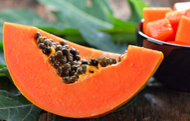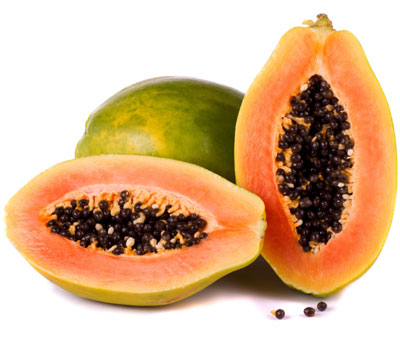





1. Papaya Facts
2. Types of Papaya
3. Nutritional Value of Papaya
4. Health Benefits of Papaya
Papaya, (Carica papaya), succulent fruit of a large plant of the family Caricaceae.
The flesh of a ripe papaya is a soft, juicy, and sweet orange-red or yellow colour, with a buttery texture and a sweet, slightly musky flavour. The flesh is added to smoothies, salads, or used in cooking, while the black seeds are also edible and have a peppery taste.
History and Origin
Papayas originated in southern Mexico and Central America and were introduced to the Old World by Spanish explorers in the 16th century. From there, they spread through the Caribbean and tropical Asia, and were later brought to Africa by European colonists, before being distributed across the tropics. Today, papayas are cultivated throughout the tropical and warmer subtropical parts of the world, including Hawaii, India, Australia, and Africa.
- • Red Papaya
- • Yellow Pawpaw
The two main types of papaya grown and sold in Australia are Red Papaya and Yellow Pawpaw, with Red Papaya making up the majority of fresh production. Red Papaya is also known as 'papaya,' while Yellow Pawpaw is called 'paw paw' or 'papaw'.
Papaya types
Red Papaya
Characteristics: Sweet, red-orange flesh.
Market share: Accounts for approximately 85% of Australia's fresh papaya production.
Growing regions: Predominantly grown in tropical regions of Queensland, the Northern Territory, and Western Australia.
Yellow Pawpaw
Characteristics: Yellow flesh.
Market share: Accounts for about 15% of Australia's fresh papaya production.
Growing regions: Grown in similar tropical and sub-tropical regions to red papaya.
Hybrids: Several specific, yellow-fleshed hybrids are grown, each with different characteristics like fruit shape, yield, and sweetness (e.g., YD1B, YD6, YD11B).
Green Papaya
Characteristics: This is not a separate type of papaya but refers to any papaya picked while still green and unripe.
Use: Can be used in cooking as a vegetable.
Fruit ” Papaya ” ( Nutritional value )
Nutritional value per 100 g
Papayas, raw
|
Nutrient ( Proximate’s )
|
Unit
|
Value
|
Daily Value %
|
|
Energy
|
kcal
|
43
|
2.1%
|
|
Protein
|
g
|
0.47
|
0.9%
|
|
Total lipid (fat)
|
g
|
0.26
|
0.3%
|
|
Carbohydrate, by difference
|
g
|
10.82
|
3.9%
|
|
Fiber, total dietary
|
g
|
1.7
|
6.0%
|
|
Sugars, total
|
g
|
7.82
|
|
|
Minerals
|
|||
|
Calcium, Ca
|
mg
|
20
|
1.5%
|
|
Iron, Fe
|
mg
|
0.25
|
1.3%
|
|
Magnesium, Mg
|
mg
|
21
|
5%
|
|
Phosphorus, P
|
mg
|
10
|
0.8%
|
|
Potassium, K
|
mg
|
182
|
3.8%
|
|
Sodium, Na
|
mg
|
8
|
0.3%
|
|
Zinc, Zn
|
mg
|
0.08
|
0.7%
|
|
Copper, Cu
|
mg
|
0.045
|
5%
|
|
Manganese, Mn
|
mg
|
0.040
|
1.7%
|
|
Selenium, Se
|
mcg
|
0.6
|
1.0%
|
|
Vitamins
|
|||
|
Vitamin C, total ascorbic acid
|
mg
|
60.9
|
67.6%
|
|
Thiamin (B-1)
|
mg
|
0.023
|
1.9%
|
|
Riboflavin (B-2)
|
mg
|
0.027
|
2.0%
|
|
Niacin (B-3)
|
mg
|
0.357
|
2.2%
|
|
Pantothenic acid (B-5)
|
mg
|
0.191
|
3.8%
|
|
Vitamin B-6
|
mg
|
0.038
|
2.2%
|
|
Vitamin B-12
|
mg
|
0.00
|
|
|
Folate DFE (dietary folate) (B-9)
|
mcg
|
37
|
9.2%
|
|
Vitamin A, RAE (retinol)
|
mcg
|
47
|
5.2%
|
|
Vitamin E (alpha-tocopherol)
|
mg
|
0.30
|
2%
|
|
Vitamin D (D2 + D3)
|
mcg
|
0
|
|
|
Vitamin K (phylloquinone)
|
mcg
|
2.6
|
2.1%
|
|
Lipids
|
|||
|
Saturated Fatty Acids
|
g
|
0.081
|
0.4%
|
|
Monounsaturated Fatty Acids
|
g
|
0.072
|
|
|
Polyunsaturated Fatty Acids
|
g
|
0.058
|
|
|
Trans Fatty Acids
|
g
|
0.000
|
|
|
Carotenoids
|
|||
|
Beta-Carotene
|
mcg
|
274
|
|
|
Alpha-Carotene
|
mcg
|
2
|
|
|
Lycopene
|
mcg
|
1828
|
|
|
Beta-Cryptoxanthin
|
mcg
|
589
|
|
|
Lutein + zeaxanthin
|
mcg
|
89
|
|

|
Reference Values are based on a 2,000 Calorie Intake, for Adults and Children 4 or More Years of Age. Your daily values may be higher or lower depending on your calorie needs.
|
|
Percentages are roughly approximated using (RDA) Recommended Dietary Allowances for adults. Source: USDA United States Department of Agriculture
|
|
Reference Values for Nutrition – National Institutes of Health USA
|
Papaya Nutritional Value
Papayas offer numerous health benefits, including aiding digestion, improving heart and skin health, and providing immune support. They are rich in vitamins, antioxidants, and the digestive enzyme papain, which helps break down proteins and can reduce inflammation and signs of aging.
Other benefits not listed on table below;
Good for weight management - Yes, papaya is good for weight management as it is low in calories, high in fiber and water content, and can help with digestion and satiety. It should be consumed as part of a balanced diet that includes physical activity, as it is not a magic cure for weight loss on its own.
Supports wound healing - Papaya supports wound healing through several mechanisms, including enzymatic debridement by the protein-digesting enzymes papain and chymopapain, which break down dead tissue. It also contains vitamin C, which is crucial for collagen synthesis, a key component of new tissue. Additionally, papaya has reported antimicrobial and antioxidant properties that help protect the wound area.
Anti-inflammatory effects - Papaya has anti-inflammatory effects due to its enzymes, particularly papain, and its high concentration of antioxidants and phytochemicals. These components work by breaking down proteins involved in the inflammatory response, reducing inflammatory markers like C-reactive protein (CRP) and pro-inflammatory cytokines, and protecting against oxidative stress. Papaya has been studied for its potential to help with conditions involving inflammation, such as arthritis, and for its general anti-inflammatory properties that support cardiovascular and digestive health.
- PROTECTS VISION
Papaya protects vision by providing antioxidants like beta-carotene, vitamin A, and zeaxanthin, which guard against eye diseases like age-related macular degeneration and cataracts. These compounds protect the retina from damage caused by oxidative stress and harmful blue light. - BOOSTS IMMUNITY
Papaya boosts immunity due to its high content of vitamin C, a powerful antioxidant that strengthens the immune system. It also contains other immune-supporting nutrients like vitamin A, potassium, folate, and antioxidants that fight inflammation and oxidative stress. The fruit also contains the enzyme papain, which has anti-inflammatory properties that further aid the body's defences. - MAY LOWER CANCER RISK
Research shows that the antioxidants in papaya, particularly lycopene, can reduce cancer risk and benefit those undergoing cancer treatment. Papaya may have unique effects not found in other fruits. - AIDS DIGESTION
Papaya aids digestion primarily through the enzyme papain, which helps break down proteins. This can reduce bloating and gas, support those with digestive disorders like IBS, and help with the overall efficiency of nutrient absorption. Papaya also contains fiber, which promotes regular bowel movements.

- SUPPORTS HEART HEALTH
Papaya supports heart health through its high content of antioxidants, fiber, and potassium. These nutrients help lower cholesterol, regulate blood pressure, and reduce the risk of heart disease by preventing cholesterol oxidation and lowering homocysteine levels. - SKIN HEALTH
Papaya benefits skin health by exfoliating and hydrating it, reducing wrinkles, and helping to heal blemishes, scars, and sunburn. Its key enzyme, papain, gently removes dead skin cells and unclogs pores, while vitamins and antioxidants protect against sun damage and signs of aging. - PROMOTES A YOUTHFUL APPEARANCE
Papaya promotes a youthful appearance by using antioxidants and enzymes to exfoliate dead skin, reduce wrinkles, and protect against damage. It contains vitamins A and C, lycopene, and the enzyme papain, which helps fight free radicals, stimulates collagen production, and gently removes dead skin cells, leading to smoother, brighter skin. - PROMOTES REGULARITY
Papaya promotes regularity due to its high content of fiber, water, and the digestive enzyme papain. Fiber and water support regular bowel movements by adding bulk and softening stool, while papain helps break down proteins, which aids in digestion and can reduce bloating and constipation.
References
Nutrient Database – USDA (United States Department of Agriculture)
Reference Values for Nutrition – FDA U.S. Food and Drug Administration
Aids digestion - Papaya aids digestion primarily through the enzyme papain, which helps break down proteins. This can reduce bloating and gas, support those with digestive disorders like IBS, and help with the overall efficiency of nutrient absorption. Papaya also contains fiber, which promotes regular bowel movements.
Promotes regularity - Papaya promotes regularity due to its high content of fiber, water, and the digestive enzyme papain. Fiber and water support regular bowel movements by adding bulk and softening stool, while papain helps break down proteins, which aids in digestion and can reduce bloating and constipation.
Supports Heart health - Papaya supports heart health through its high content of antioxidants, fiber, and potassium. These nutrients help lower cholesterol, regulate blood pressure, and reduce the risk of heart disease by preventing cholesterol oxidation and lowering homocysteine levels.
Skin health - Papaya benefits skin health by exfoliating and hydrating it, reducing wrinkles, and helping to heal blemishes, scars, and sunburn. Its key enzyme, papain, gently removes dead skin cells and unclogs pores, while vitamins and antioxidants protect against sun damage and signs of aging.
Promotes a youthful appearance - Papaya promotes a youthful appearance by using antioxidants and enzymes to exfoliate dead skin, reduce wrinkles, and protect against damage. It contains vitamins A and C, lycopene, and the enzyme papain, which helps fight free radicals, stimulates collagen production, and gently removes dead skin cells, leading to smoother, brighter skin.
Supports wound healing - Papaya supports wound healing through several mechanisms, including enzymatic debridement by the protein-digesting enzymes papain and chymopapain, which break down dead tissue. It also contains vitamin C, which is crucial for collagen synthesis, a key component of new tissue. Additionally, papaya has reported antimicrobial and antioxidant properties that help protect the wound area.
Boosts immunity - Papaya boosts immunity due to its high content of vitamin C, a powerful antioxidant that strengthens the immune system. It also contains other immune-supporting nutrients like vitamin A, potassium, folate, and antioxidants that fight inflammation and oxidative stress. The fruit also contains the enzyme papain, which has anti-inflammatory properties that further aid the body's defences.
Anti-inflammatory effects - Papaya has anti-inflammatory effects due to its enzymes, particularly papain, and its high concentration of antioxidants and phytochemicals. These components work by breaking down proteins involved in the inflammatory response, reducing inflammatory markers like C-reactive protein (CRP) and pro-inflammatory cytokines, and protecting against oxidative stress. Papaya has been studied for its potential to help with conditions involving inflammation, such as arthritis, and for its general anti-inflammatory properties that support cardiovascular and digestive health.
Protects vision - Papaya protects vision by providing antioxidants like beta-carotene, vitamin A, and zeaxanthin, which guard against eye diseases like age-related macular degeneration and cataracts. These compounds protect the retina from damage caused by oxidative stress and harmful blue light.
May lower cancer risk - Research shows that the antioxidants in papaya, particularly lycopene, can reduce cancer risk and benefit those undergoing cancer treatment. Papaya may have unique effects not found in other fruits.
Good for weight management - Yes, papaya is good for weight management as it is low in calories, high in fiber and water content, and can help with digestion and satiety. It should be consumed as part of a balanced diet that includes physical activity, as it is not a magic cure for weight loss on its own.
Supports strong bones - Papaya supports strong bones due to its content of key nutrients like vitamin K, vitamin C, and calcium.
